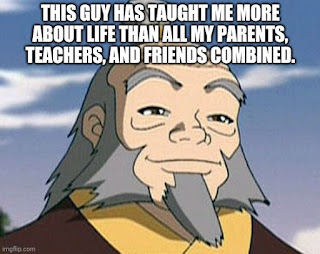Prior to the beginning of AtLA, Uncle Iroh has spent years recovering from the loss of his son. Episode 15 of season 2, "Tales of Ba Sing Se," shows Iroh doing acts of kindness around the city of Ba Sing Se, including de-escalating a man who attempted to mug him. Rather than fight and subdue the would-be criminal, Iroh sees the man’s humanity and desperation. His quick thinking saves the picnic basket in his hand.
The reason Iroh has become such a forgiving and caring man is demonstrated at the end, when the picnic basket turns out to be part of a moment he has planned to spend in remembrance of the son he lost at war, in Ba Sing Se, years and years ago. The song he sings, Leaves from the Vine, has taken on a life of its own beyond the show, expressing loss and grief that words alone cannot express. It also reveals why Iroh has sustained such powerful convictions that carried him through his nephew's abuse and exile from a nation he once gave everything to serve.
Makoto Iwamatsu, usually known as Mako, voiced Uncle Iroh for most of the show. Mako sadly passed away prior to the airing of Tales of Ba Sing Se, and was replaced for future episode by Greg Baldwin, a student of Mako. At times, fans have asked Baldwin to sing "Leaves from the Vine," but he refuses. He says that song "belongs to Mako." Dante Basco, the voice of Zuko, has also expressed deep love and appreciation for Mako.
Iroh and Zuko eventually are captured by the Fire Nation. Zuko is returned to his place in the royal family. Iroh, on the other hand, is imprisoned. He pretends to be full cuckoo-pants, while secretly training himself into full beast mode. He then uses his recovered muscle and escapes his prison cell and rejoins the White Lotus, the organization which has been waiting for the return of the Avatar.
Iroh and Zuko are reunited in the camp of the white lotus, after Zuko joined the Avatar’s team, through no small effort of his own. Zuko collapses before going inside. He says “My uncle hates me, I know it.” Iroh was kind in every way but Zuko fought and rejected him. When Zuko finally enters, before he can complete his apology, Iroh rushes forward and embraces him. Uncle Iroh is clearly relieved that his efforts have resulted in sparing Zuko at least some of the regret that he felt after losing his son at war.
Forgiveness and humor come easily to Iroh. He shares his life-changing wisdom through advice and walking beside the not only Zuko but, Aang, Toph, and others. Mentors are there in a story to guide a character toward their destiny. As phenomenally written characters sometimes do, Iroh has become a symbol of the guide we all want in our own lives. It just so happens the AtLA is particularly rich in examples of the humanity of its featured mentor. It turns out, even just one such guide can make a huge difference even in a terribly difficult and traumatic life. Our growth as people stems from determination and perspective exactly like what Uncle Iroh demonstrates through a little old show that aired on Nickelodeon in the mid 2000s.
Well done, AtLA. We're looking forward to the Netflix live action remake later this year with much anticipation.

























